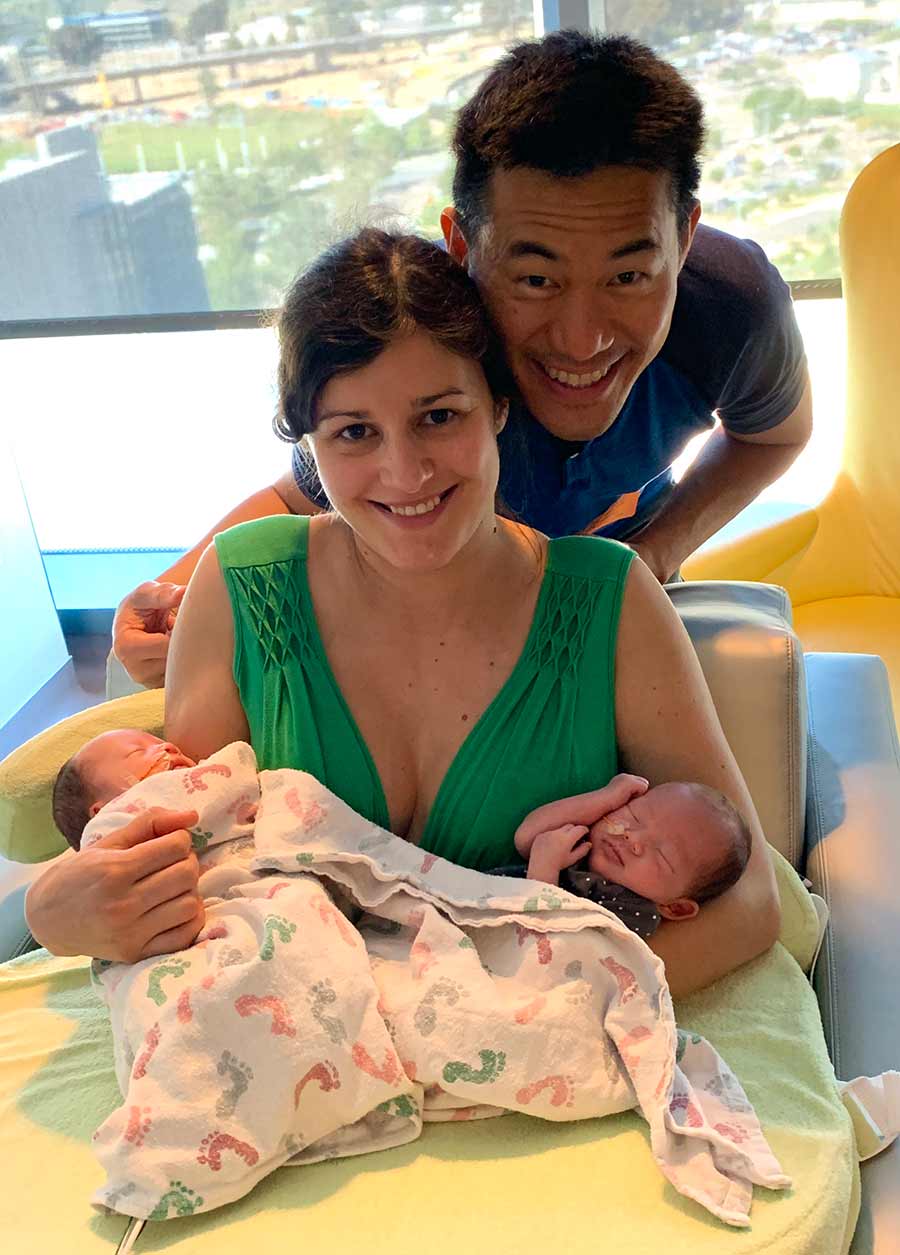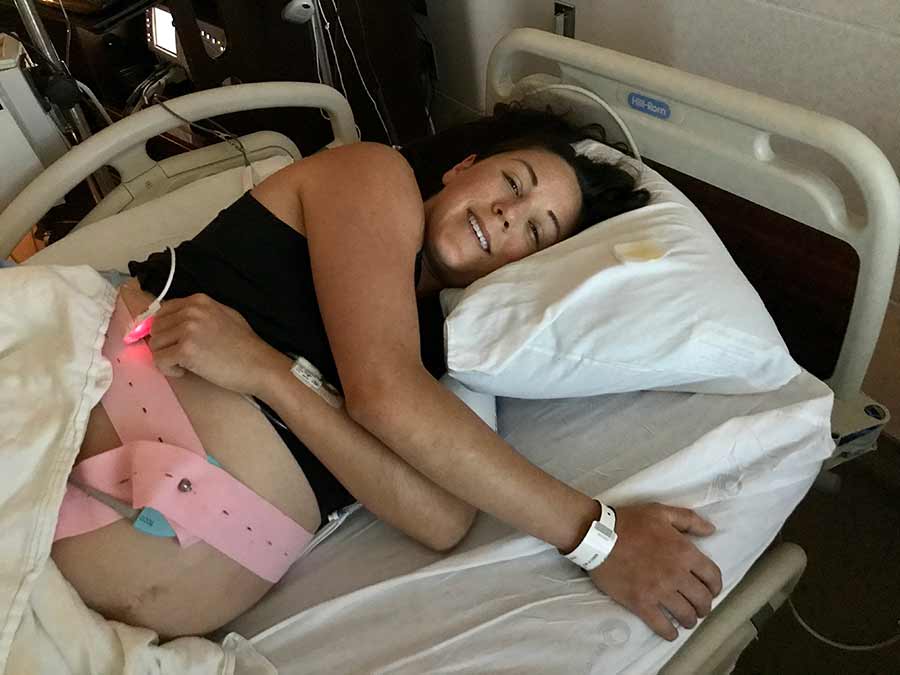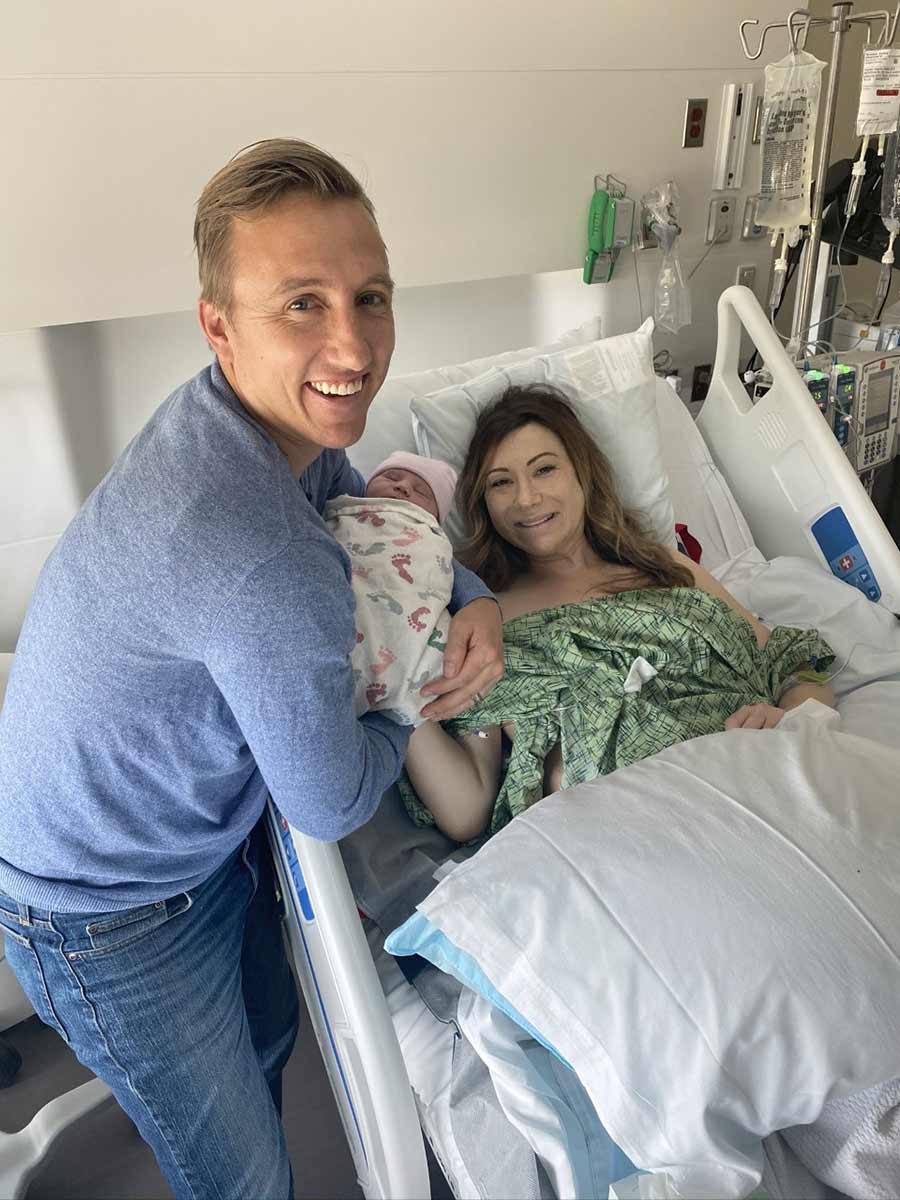By:
- Michelle Brubaker
Published Date
By:
- Michelle Brubaker
Share This:
Bringing a Child into the World, While the World Battles COVID-19
It was Halloween 2019 when Gene Yeo and Corina Antal learned they were going to have twin girls. “We were beyond excited,” said Antal.
But they also learned that day that their daughters were monoamniotic (MoMo) twins, which means the fetuses shared a single placenta and amniotic sac. It’s an extremely rare type of pregnancy, occurring in just 1 in 60,000 pregnancies.
Pregnancies with MoMo twins are considered very high risk because of heightened dangers of umbilical cord entanglement and compression. This meant Antal would be under close supervision by her medical team. “I had to go to the clinic for ultrasounds every two weeks and knew I would be hospitalized several weeks before delivery for fetal monitoring.”
But the parents were undaunted.

“What impressed me about Corina and Gene when we first met was that they took the news really well. By the second visit, they had done their homework,” said Dr. Maryam Tarsa, obstetrician and gynecologist at UC San Diego Health. “They were very flexible, positive and confident.”
Then, the COVID-19 pandemic hit.
Yeo is a professor in the Department of Cellular and Molecular Medicine at UC San Diego School of Medicine, and Antal is a postdoctoral fellow at the Salk Institute for Biological Studies. “As scientists, we were not only reading all the studies we could find on MoMo twins, but we were now learning all we could about COVID-19,” said Yeo.
Tarsa said based on current evidence, most pregnancies are likely unaffected by COVID-19. “But we continue to tell our pregnant patients to follow all the recommendations from local government and health agencies to lower the risk of contracting the virus.”
In early March, when the COVID-19 pandemic was escalating in the United States, but measures like physical distancing had not yet been implemented, Yeo and Antal had their baby shower.
“We chose to have it on International Women’s Day since we were having identical twin girls,” said Antal. “Everyone in attendance was asked to wash their hands upon arrival and we elbow bumped instead of hugging or shaking hands. This was just the beginning of the new and strange social norms we would have to get accustomed to.”
When it was discovered the twins had growth restrictions with concerning blood flow, the first-time mom was admitted to Jacobs Medical Center at UC San Diego Health at 30 weeks.
“I was given a COVID-19 test, which was negative, and we began continuously monitoring the twins’ heart rates. Luckily, Gene was allowed to visit,” said Antal. “I was anxious at first about being in the hospital. I had been sanitizing everything at home, but now I was going into an environment that I didn’t have as much control over.”
It’s a common concern that Tarsa hears from patients right now. “Going through pregnancy and its potential complications can create more stress during this pandemic. UC San Diego Health has taken all safety measures to ensure the safety of our patients while providing the best quality of care during such unusual circumstances.”
Some of those safety measures include staff, patients and visitors screened for COVID-19 symptoms upon arrival every day and everyone inside the hospital or clinic setting being required to wear masks. All patients admitted to the hospital also receive a COVID-19 nasal swab test.
Antal was hospitalized for 11 days before giving birth. “Everyone from nurses and doctors to nutritional services and custodians wore masks and kept my room extremely sanitized, keeping our risk of any exposure low and putting my nerves at ease.”
Due to a deceleration in heart rate, it was decided the twins would be delivered at 32 weeks gestation via Caesarean section.
Emilleen and Emabelle were born weighing approximately three pounds each. Despite the umbilical cords being knotted together, there were no critical complications at birth.
However, because they were high risk and born prematurely, they spent five weeks combined in the neonatal intensive care unit. The family of four was able to all go home together on May 19.
“We are so grateful for our healthy daughters and the incredible care we received throughout our pregnancy and while we were in the hospital. We are now enjoying every moment with them at home as a family," said Antal.
A hands-off approach to a hands-on service
Kelsey Graham had her birth plan in place while pregnant with her first child. She went through the midwifery program at UC San Diego Health and envisioned an unmedicated birth with a doula by her side in the Birth Center at Jacobs Medical Center. “But then, COVID-19 started to spread worldwide, and I didn’t think using the doula service would still be an option,” said Graham.
UC San Diego Health’s Hearts & Hands Volunteer Doula Program is a free service that allows women to request an on-call volunteer doula at any hour. The doulas stay with the mothers-to-be until her baby is born, no matter how long it takes and regardless of whether pain medications are used or whether complications develop. They offer support, such as massages, breathing techniques and positioning assistance.
With a global pandemic and physical distancing guidelines in place, it was decided the program would turn to technology to support patients.
“Being a doula is really hands-on, so I wasn’t sure how it would work virtually. The reality of the pandemic meant our program needed to use technology as a bridge from our standard practices,” said Liz Mortensen, doula at UC San Diego Health with five children of her own. “We usually only meet our patients when they are in labor, but I got to interact with Kelsey and her husband a few times over Zoom prior to her delivery. I learned their desires, hopes and dreams for childbirth.”

When Graham learned she was not dilated a few days before her due date, she was discouraged. Her husband sent a text to Mortensen. “She gave him a lot of guidance on how to best support me.”
Nine days after that text, Graham did go into labor, which lasted approximately 65 hours and involved an epidural.
“Liz validated my decisions and provided encouragement when it was clear my birth plan was not going to plan at all,” said Graham. “Not only was she supporting me, but she was guiding my husband through the experience and reminding him to take care of himself and do things like eat and drink water.”
Due to complications, Graham required a Cesarean section. Mortensen was there for the couple throughout the process via text messages and phone calls.
“Kelsey received amazing support from her entire medical team on the day of her birth. Part of my role was to remind the couple of what they had already learned in classes and during our Zoom meetings,” said Mortensen. “It was different from any other birth I have participated in, but it was a wonderful experience.”
Lila was born on May 12, 2020, weighing a little more than nine pounds. “We are so grateful for our healthy daughter and our medical team. Although there were some nerves surrounding giving birth during a pandemic, we felt safe during our entire hospital stay. I am so happy we made the decision to have our baby at UC San Diego Health and that Liz was part of our childbirth journey.”
The Hearts & Hands Volunteer Doula Program is now in transition of doulas supporting patients in-person again with all safety guidelines in place. “I am so happy that we could continue to support our patients during the pandemic using creative solutions and with the advancement of technology,” said Mortensen.
Another day for them, a lifetime of memories for us
“To say it was scary is a bit of an understatement,” said Danica McAdam. As local television reporters, Danica and her husband, Jeff, had been informing the public about COVID-19, but in March, the virus was impacting them personally.
Danica has type 1 diabetes. The chronic condition, coupled with some other factors, made her pregnancy high risk. “For the safety of my baby and myself, I chose to have a scheduled Cesarean section.”
As they were confirming the delivery date, COVID-19 was starting to spread across the nation. Danica and Jeff thought maybe it would be wiser to deliver earlier if feasible. “It was right around the time when everything was shutting down. I asked Dr. Ramos if we should move the Cesarean date up. Dr. Ramos felt confident the due date we had scheduled was the healthiest option,” said Danica.
“COVID-19 has changed the landscape of health care. UC San Diego Health has been on the forefront and has maintained a high level of safety for all of our patients,” said Dr. Gladys (Sandy) Ramos, perinatologist at UC San Diego Health.
The next big concern for the couple was wondering if Jeff could be in the delivery room supporting his wife. “At that time, other places in the nation were not allowing a partner in the room. That terrified me,” said Danica.

During the pandemic, UC San Diego Health does have visitor restrictions but there can be one support person in the delivery room, as well as in the postpartum rooms. “We are doing everything we can to provide a safe environment while giving couples the ability to experience childbirth together and bond with their newborns,” said Ramos.
“I couldn’t have gotten through all that without Jeff,” said Danica.
When the couple arrived to the hospital, Jeff says they were still a little nervous.
“There was so many unknowns at that time in regards to the virus. We showed up that morning wearing our masks and gloves and hit the elevator buttons with our elbows. We just didn’t know what to expect going up to the labor and delivery floor. When the doors opened, we were so relieved. The staff took incredible care of us.”
Danica and Jeff’s son, Landon, was born on March 23, 2020 weighing eight pounds, 13 ounces.
“We couldn’t have family visit in the hospital so we were so grateful to the staff for all the help they provided,” said Jeff. “From the doctors to lactation services and the nurse who helped Danica put a onesie on our son for the first time, we were surrounded by so much kindness. It may have been just another day to them but we will remember those gestures for a lifetime.”
Learn more about maternity care at UC San Diego Health during COVID-19.
Share This:
Stay in the Know
Keep up with all the latest from UC San Diego. Subscribe to the newsletter today.



